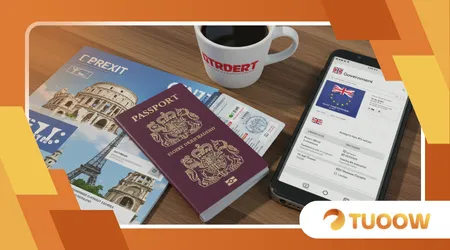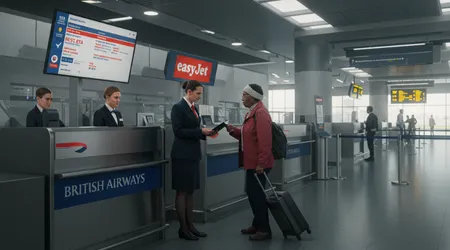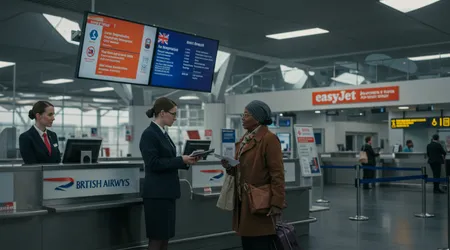Post-Brexit Tourism and ETA Requirements

Tourism in the UK, a vibrant economic driver, faces new hurdles in 2025. Post-Brexit regulations, particularly the Electronic Travel Authorization (ETA), reshape how visitors enter.
This digital permit, mandatory for EU citizens since April 2, 2025, costs £16 and allows multiple six-month stays over two years.
Beyond logistics, the ETA’s financial implications ripple across tourism businesses, traveler budgets, and the broader UK economy.
Why should travelers and businesses care? This article unpacks the ETA’s impact, offering sharp insights and practical guidance.
The UK’s exit from the EU in 2020 severed seamless travel ties. Previously, EU citizens crossed borders with ID cards.
Now, passports and ETAs are non-negotiable. This shift, part of a broader border security push, mirrors global trends like the US’s ESTA.
Yet, it’s not just about compliance tourism is a financial juggernaut, contributing £127 billion annually to the UK economy, per VisitBritain.
The ETA’s introduction could sway this figure, for better or worse.
This piece dives into the ETA’s financial stakes, from hospitality revenue to traveler costs. We’ll explore compliance challenges, economic risks, and strategic opportunities.
Expect real data, vivid examples, and a clear-eyed view of tourism’s future. Let’s navigate this new landscape together.
The ETA’s Financial Footprint on Tourism
The ETA, a £16 digital permit, seems modest but carries weight. For a family of four, that’s £64 before flights or hotels.
In 2024, 1.1 million ETAs were issued, generating £11 million, per the UK Home Office. This revenue stream funds border tech but burdens travelers.
Solo backpackers like Maria, a fictional Spaniard, now budget extra for UK trips. Her £200 weekend getaway balloons with ETA fees, nudging her toward visa-free destinations like Ireland.
Hospitality businesses feel the pinch too. Fewer spontaneous EU visitors could dent bookings. A Brighton café owner, reliant on summer tourism, fears a 10% revenue drop.
The ETA’s application process, though quick via the UK ETA app, adds friction. Unlike Canada’s eTA, which processes instantly, UK approvals can take hours.
++ Fiscal Policy and Public Spending: Navigating New Rules in the UK
This delay risks deterring last-minute travelers, a key tourism segment. Businesses must adapt, perhaps offering ETA guidance to guests.
Yet, there’s a silver lining. The ETA’s revenue could enhance border efficiency, indirectly boosting tourism. Streamlined checks might reduce airport queues, improving visitor experiences.
Hotels could bundle ETA fees into packages, easing costs for guests. The challenge lies in balancing compliance with welcoming vibes tourism thrives on ease, not bureaucracy.

Economic Risks to the Tourism Ecosystem
The UK’s tourism sector employs 3 million people, from London tour guides to Scottish innkeepers. Post-Brexit, 45% of Scottish tourism businesses reported staff shortages due to lost EU labor.
The ETA adds another layer of complexity. European tourists, deterred by fees and forms, might opt for Schengen zones with simpler entry.
A fictional German couple, Hans and Lena, skips London for Paris, avoiding ETA hassles. This choice echoes across pubs, museums, and taxis.
Also read: Inflation in the UK: Trends and Government Response in 2025
Small businesses face the steepest climb. A Lake District B&B, already grappling with inflation, can’t absorb marketing costs to lure non-EU visitors.
The ETA’s £16 fee, rising from £10 in April 2025, compounds traveler hesitation. Data shows 20% of EU tourists reconsider UK trips due to added costs.
This isn’t just a fee it’s a psychological barrier, like a “keep out” sign at the border.
On a macro level, reduced tourism threatens GDP. If visitor numbers drop 5%, billions in revenue vanish. Airports, hit by fewer transatlantic layovers needing ETAs, lose retail sales.
The ripple effect is stark: less tourism, fewer jobs, weaker growth. Yet, the UK could counter this by promoting ETA benefits, like enhanced security, to reassure cautious travelers.
Compliance Costs and Traveler Behavior
Applying for an ETA is straightforward but not free of friction. Travelers submit passport details, a photo, and answer eligibility questions online.
The £16 fee, payable via the gov.uk portal, feels nominal but compounds for frequent visitors. Take Luca, an Italian consultant traveling monthly to London.
His annual ETA costs hit £192, rivaling a budget flight. This nudges him toward virtual meetings, hurting UK tourism revenue.
Read more: UK Economic Growth Forecasts for 2025: Challenges and Opportunities
Unofficial sites, charging up to £128 for ETA processing, prey_daily, pose another risk.
These scams prey on unaware travelers, inflating costs. Businesses must educate guests to use official channels.
For small hotels, this means added staff training another hidden cost. The table below outlines key ETA details:
| Aspect | Details |
|---|---|
| Cost | £16 (from April 9, 2025) |
| Validity | 2 years or until passport expires |
| Application Time | Minutes to hours via UK ETA app or gov.uk |
| Eligibility Questions | Criminal history, travel purpose, health status |
| Stay Duration | Up to 6 months per visit, multiple entries |
Compliance isn’t just financial it’s emotional. Travelers resent extra steps, especially post-Brexit. A 2025 survey found 30% of EU citizens feel less welcome in the UK.
This perception could steer them to destinations with fewer barriers, shrinking tourism flows. Businesses must counter this with warmth, like offering ETA application kiosks at airports.
The flip side? The ETA’s digital nature aligns with modern travel. Younger tourists, tech-savvy and global, might shrug off the process.
For them, it’s like buying a concert ticket online annoying but doable. Tourism boards could lean into this, marketing the UK as a secure, cutting-edge destination.
Strategic Opportunities for Tourism Businesses
Adapting to the ETA era demands creativity. Hotels could absorb ETA fees for loyalty members, mimicking airline perks.
A Manchester boutique hotel might offer “ETA-Free Stays” for repeat guests, boosting retention.
Marketing campaigns should highlight the UK’s unique draw think Stonehenge, not paperwork.
VisitBritain could launch a “Welcome Back” campaign, emphasizing ease despite ETAs.
Partnerships are key. Airlines like British Airways could integrate ETA applications into booking platforms, streamlining the process.
Imagine booking a flight and securing an ETA in one click convenience drives tourism.
Local businesses could collaborate with travel agencies to pre-approve ETAs for group tours, reducing stress for visitors like a seasoned guide leading a hike.
Data offers hope: 80% of ETA applications are approved within hours. This efficiency could be a selling point.
Tourism boards should tout fast approvals to counter perceptions of red tape. By framing the ETA as a security badge, not a hurdle, the UK can maintain its allure as a must-visit destination.
The Global Context: A New Normal for Travel

The UK’s ETA isn’t an outlier it’s part of a global shift. The EU’s ETIAS, set for 2026, will require non-EU travelers, including Brits, to pay €7 for entry.
Canada’s eTA and the US’s ESTA already mirror this model. Tourism worldwide is embracing digital pre-clearance, like a global guest list for a high-security party.
The UK’s challenge is standing out in this crowded club.
Reciprocity shapes traveler sentiment. Brits facing ETIAS fees might empathize with EU visitors’ ETA gripes.
This mutual inconvenience could foster dialogue, softening post-Brexit tensions. Tourism boards should highlight shared experiences, framing ETAs and ETIAS as modern travel’s price of safety.
A unified message could turn grumbling into acceptance.
Long-term, ETAs might normalize. Just as passports replaced open borders, digital permits could become routine.
Tourism businesses that adapt early offering seamless ETA support or fee offsets will lead the pack.
The UK’s edge lies in its cultural pull: no fee can dim the lure of Shakespeare’s Globe or Highland castles.
Conclusion: Charting the Future of UK Tourism
The ETA, a post-Brexit reality, reshapes UK tourism with financial and emotional stakes. At £16, it’s a small fee with big ripples deterring some, nudging others to rivals like France.
Yet, the UK’s £127 billion tourism sector is resilient. Businesses can thrive by absorbing costs, streamlining applications, and doubling down on hospitality.
The 1.1 million ETAs issued in 2024 prove travelers will pay for the UK’s charm.
This isn’t just about borders; it’s about perception. Will the UK feel open or walled off? Smart strategies think bundled fees or “Welcome Back” campaigns can tilt the scales.
Tourism is storytelling, and the UK’s tale is one of history, vibrancy, and grit. By embracing the ETA as a security badge, not a barrier, the sector can soar. Let’s write the next chapter together.
Frequently Asked Questions
Who needs an ETA to visit the UK?
EU citizens, plus nationals from 48 non-European countries (e.g., US, Canada), need an ETA for short UK stays from April 2, 2025.
How long is an ETA valid?
An ETA lasts two years or until your passport expires, allowing multiple six-month visits for tourism, business, or study.
Can I apply for an ETA at the airport?
No, you must apply online via gov.uk or the UK ETA app before travel. Airport kiosks may assist but don’t process applications.
What happens if I don’t get an ETA?
Without an ETA, you’ll be denied boarding or entry to the UK. Always apply early to avoid travel disruptions.
Are there exemptions from the ETA fee?
No fee exemptions exist for the ETA. All eligible travelers pay £16, regardless of age or travel purpose.
